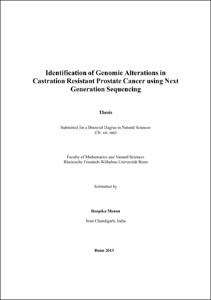Identification of Genomic Alterations in Castration Resistant Prostate Cancer using Next Generation Sequencing

Identification of Genomic Alterations in Castration Resistant Prostate Cancer using Next Generation Sequencing

| dc.contributor.advisor | Perner, Sven | |
| dc.contributor.author | Menon, Roopika | |
| dc.date.accessioned | 2020-04-19T17:40:09Z | |
| dc.date.available | 2020-04-19T17:40:09Z | |
| dc.date.issued | 03.01.2014 | |
| dc.identifier.uri | https://hdl.handle.net/20.500.11811/6004 | |
| dc.description.abstract | Castration resistant prostate cancer (CRPC) is the most aggressive form of prostate cancer (PCa). For the development of novel therapeutic targets for CRPC, it is key to decipher the molecular alterations underlying this lethal disease. Next generation sequencing (NGS) technologies have revolutionized cancer research by detecting genomic alterations, nucleotide substitutions, insertions, deletions and copy number alterations. This project was focused on identifying novel genes involved in CRPC by assessing somatic copy number alterations (SCNA) using whole exome sequencing on five CRPC and paired normal formalin fixed paraffin embedded (FFPE) samples by the SOLiD4 next generation sequencing platform. The central aim of this study was the identification of therapeutic targets for CRPC. Due to the unavailability and scarcity of fresh frozen CRPC material for research purposes, the primary aim of this study was to compare the DNA, RNA and protein integrity in fixed tissues obtained from pathology archives. Secondly, validity of formalin fixed paraffin embedded (FFPE) and fresh frozen PCa tissue, from the same patient, was determined by whole exome sequencing. A large data overlap between both fixed tissue types was observed. This eventually led to the main objective of the study involving the identification of therapeutic targets for CRPC. FFPE and HOPE fixed specimen were comparable in DNA quality for downstream research purposes. Furthermore, FFPE tumor and fresh frozen tumor exome sequencing data, from the same patient, showed an overlap in the SNV analysis. This led to the central aim which included the analysis of somatic copy number alterations (SCNA) using whole exome sequencing on five CRPC and paired normal FFPE samples by the SOLiD4 next generation sequencing platform. The sequencing data identified two genes, YWHAZ and PTK2. Both genes, located on chromosome 8, were amplified on all five sequenced patients. Furthermore, the amplification frequency of both genes increased depending on the stage of PCa: prostate confined or localized PCa, lymph node metastasized PCa and CRPC. YWHAZ knockdown in the PC-3 cell line impaired proliferation and migration. Similarly, PTK2 inhibition, using a pharmacological inhibitor, TAE226 inhibitor, significantly affected both cell migration and proliferation at a concentration of 10 μM. Overall, these findings suggest that inhibiting both YWHAZ and PTK2 could potentially delay cancer progression in patients harboring the amplification of the latter genes. Furthermore, FFPE tissue could be used as a promising alternative to fresh frozen tissue for NGS technologies. | |
| dc.language.iso | eng | |
| dc.rights | In Copyright | |
| dc.rights.uri | http://rightsstatements.org/vocab/InC/1.0/ | |
| dc.subject.ddc | 570 Biowissenschaften, Biologie | |
| dc.subject.ddc | 610 Medizin, Gesundheit | |
| dc.title | Identification of Genomic Alterations in Castration Resistant Prostate Cancer using Next Generation Sequencing | |
| dc.type | Dissertation oder Habilitation | |
| dc.publisher.name | Universitäts- und Landesbibliothek Bonn | |
| dc.publisher.location | Bonn | |
| dc.rights.accessRights | openAccess | |
| dc.identifier.urn | https://nbn-resolving.org/urn:nbn:de:hbz:5n-34539 | |
| ulbbn.pubtype | Erstveröffentlichung | |
| ulbbnediss.affiliation.name | Rheinische Friedrich-Wilhelms-Universität Bonn | |
| ulbbnediss.affiliation.location | Bonn | |
| ulbbnediss.thesis.level | Dissertation | |
| ulbbnediss.dissID | 3453 | |
| ulbbnediss.date.accepted | 19.11.2013 | |
| ulbbnediss.fakultaet | Mathematisch-Naturwissenschaftliche Fakultät | |
| dc.contributor.coReferee | Schorle, Hubert |
Dateien zu dieser Ressource
Das Dokument erscheint in:
-
E-Dissertationen (4114)




